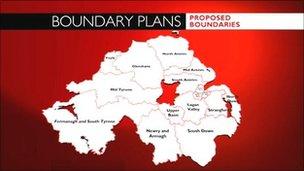DUP in 'gerrymander' maps claim over boundary plans
- Published

The proposals are part of a UK-wide exercise designed to reduce the number of MPs by 10%
The DUP has said electoral maps drawn up by the Boundary Commission are being "gerrymandered".
The party has described plans to reduce Northern Ireland's Westminster seats and create constituencies of roughly the same size as "atrocious".
It was responding to Boundary Commission proposals which would reduce the number of local MPs from 18 to 16.
The aim of the change is to reduce the number of MPs at Westminster from 650 to 600.
The changes would also create constituencies which have electorates between 72,810 and 80,473.
The plans would see Belfast losing a seat, dropping from four to three MPs. That move would put the SDLP'S Alasdair McDonnell at risk.
Under the plans West Tyrone, currently held by Sinn Fein's Pat Doherty, would disappear, as would the DUP's Gregory Campbell's East Londonderry seat.
The plan is to create a seat that has an average electorate of 76,641 voters.
Impact
In their submission to the Boundary Commission, which was released on Tuesday, the DUP described the plans as "flawed".
The party criticised the new boundaries saying they would have a "negative impact on unionism" and said the new seats of South West Belfast and South East Belfast were a "gerrymander".
A spokesman for the Boundary Commission denied the accusation and said they had carried out their business properly and thoroughly in line with legislation.
The spokesman said they rejected the DUP accusation and said "the outcome of elections is none of our business".
The SDLP have also criticised the proposal to cut the number of Belfast seats from four to three.
In their submission the party argue the plans are flawed and need to reflect the identity and community "rather than just a numerical balancing exercise".
The party also said the proposals "devastate" four rural constituencies west of the Bann - Mid Ulster, West Tyrone, Fermanagh South Tyrone and East Londonderry.
The Ulster Unionist Party said the proposals would not be "universally welcomed in a number of constituencies".
The party highlighted changes which, in their view, would "cut identifiable local ties".
The party said under the boundary reforms towns like Ballymena, Coleraine, Cookstown and Omagh would be cut off from their natural hinterlands.
Damaging
The proposals have also been attacked by Sinn Fein who have concerns about some of the planned changes in Belfast.
Sinn Fein MLA Alex Maskey argued that much work has been done in South Belfast in recent years to counter interface violence and claimed that if some wards were moved it could lead "to a damaging of relationships".
In their submission to the Boundary Commission the Alliance Party said they were "broadly content" with the changes, but the party had some concerns with some of the revamped Antrim constituencies and the proposed names for new seats.
An Alliance spokesperson said: "This is a UK-wide boundary review and it would be bizarre for anyone to say that there is an agenda against the DUP.
"The same proposals make North Belfast safer on paper for the DUP; however, elections aren't fought and won on paper or on boundaries, they are fought and won on issues and principles.
"We certainly don't rely on boundaries or changes to them for our success."
The provisional proposals were originally launched by the Boundary Commission in September 2011.
There was a 12-week public consultation period, including three public hearings which were poorly attended. Thirty-eight submissions were received by the commission including responses from political parties, community groups and individuals.
There is to be a further four-week consultation period which ends on 27 February.
The plan is to have the new boundaries in place for the next general election.
- Published13 September 2011
- Published13 September 2011